- Home
- Donis Casey
The Old Buzzard Had It Coming Page 19
The Old Buzzard Had It Coming Read online
Page 19
Shaw leaped to his feet, red faced. “That hell-blasted skunk! I’ll bash his damn head in for him.”
Alafair clapped her hands over her ears, shocked. “Shaw! That language!”
Shaw balled up his fists, bit his lip, and sat back down grumbling, still angry, but embarrassed to have forgotten himself so in front of his lady wife.
Now Scott was really interested. “You don’t say! You actually found a two-shot derringer hid in the still?”
“It was in one of the stone jars, under a little lean-to, to the side. I put it back, thinking to come and get you, but I got knocked cold instead.”
“You could have got yourself killed,” Shaw remonstrated. “Merciful heavens, if you hadn’t managed to get back to the house you might have lain there until you froze to death and we might not have found you until spring.”
“Well, I didn’t think I was in any danger, or I sure wouldn’t have gone,” she assured him. “But that reminds me, I did have help getting home. Some little ragamuffin of a boy came along and woke me, helped me up and set me to going in the right direction. I’ve never seen him before. Scott, did we have any new families move in around here recently? Maybe I should have recognized him, but I was kind of knocked stupid for a while. He sure looked familiar. He just ran off then, and I managed to get to where I got before Shaw found me.”
Scott dismissed the strange boy problem with a wave of his hand. “We can worry about that later. Do you suppose that you could take me to where this still is?”
“No, she can not,” Doc Addison interjected. He was standing in the doorway with a glass of water in one hand and his bag in the other. Who knows how long he had been standing there? They had pretty much forgotten about him. “Alafair, you’re probably not hurt very badly. He didn’t hit you hard enough to do too much damage, but that could change unless you lay right there in that bed for a day or two.”
Alafair started to protest, but Shaw reached out and put his hand over her mouth. “She will obey, Doc,” he assured the doctor.
“Alafair, you say John Lee knows where this still is?” Scott asked.
Alafair removed Shaw’s hand from her mouth with her thumb and forefinger. “He does. But I imagine the gun’s gone by now, and maybe even the still.”
“And even if the gun was still there,” Shaw added, “how could you be sure Jim Leonard is the one who put it there in the first place?”
Scott stood up and picked his hat up off the night table. “I can’t,” he admitted. “Not yet. But when I went to talk to Russell Lang, and he told me his story about going into the ditch on Wednesday evening, I asked him if he saw anyone who might back up his story. He said he only saw one other person on the road that evening. It was Jim Leonard, just drunk enough to be profane, Lang said, riding a mule toward his own place.”
“A mule,” Shaw repeated.
Scott smiled. “I didn’t think anything of it at the time. There’s mules galore. But now—now I’m thinking that two and two just might make four.”
“Here’s another two for you, if you want to make six,” Shaw told him. “Charlie-boy told us he saw Jim Leonard cutting across our property on that same Wednesday. Said he was on a mule and loaded down with saddlebags.”
“Well,” Scott said, and stood up.
“Are you going back into town?” Shaw asked his cousin, as he headed out the door.
“First I’m stopping by John Lee’s place to see if he’ll show me that still. Then I expect I’m over to the Leonards’ to arrest Jim.”
Alafair started to sit up, but Doc Addison pushed her back down and sat in the chair that Scott had vacated. “Oh, you think he’s the one who killed Harley?” she wondered. “Are you going to let Miz Day go?”
Scott shook his head. “Not so fast, Alafair. I’m suspicious of Jim Leonard, now, but I’m going to arrest him for assault, and moonshining while I’m at it. And Miz Day hasn’t unconfessed yet.” He set his hat back on his head.
“I’ll walk you out,” Shaw said. “I’ve got to drive in and pick up all those kids before they wonder what happened to me.”
“What are you going to tell them?” Alafair pressed him. “I don’t want them scared on my behalf.”
Shaw blinked and shrugged. “I’ll just tell them that you bumped your head a bit, I reckon.”
“Tell them that a jar fell off the shelf in the pantry and smacked me. Then I fell and struck my jaw. That sounds reasonable.”
“I’ll do it,” Shaw said with a laugh. “Doc, can you stay with Alafair until we get back?”
“Be glad to,” the doctor assured him.
After the men had left, Alafair looked over at the doctor, who was sitting with his arms folded across the chest of his neatly pressed black wool suit, gazing at her with a wry look in his blue eyes.
“He’ll be gone at least an hour, Doc,” Alafair told him. “You don’t have to baby-sit me.”
“Oh, I think I do,” Doc Addison assured her. “Otherwise who knows what mischief you’ll be getting into next.”
Alafair emitted an exasperated puff, and shifted a little in the bed. “Well, then, you might as well help yourself to a glass of buttermilk and a chunk of bread. There’s pie in the cabinet.”
“I’m fine. Do you need something to nibble on, yourself?”
“I couldn’t eat a thing. Stomach’s still unsteady.”
Dr. Addison helped her take the headache powder, and a companionable silence fell for some minutes. The doctor reached into his bag and pulled out a book, and Alafair stared at the ceiling.
“How’s Miz Doc?” she asked, at length.
“Ann is fine. Busy as a bee.”
Alafair made an interested noise, and then asked the question she really had in mind. “Doc, I’m worried about that child I saw in the woods. It’s colder than all get-out, and he wasn’t hardly dressed to speak of. He looked familiar to me, but I’d swear I haven’t seen him before.”
Doc Addison lowered the book into his lap. “Did he seem ragged or ill-cared for?”
“No, not a bit of it,” she confessed.
“Well, he probably belongs around here somewhere. You know youngsters hardly feel the cold. He may have been running home when he came across you. What did he look like?”
“Eight or nine years old, I’m guessing. Smallish for his age, but healthy. Had a head full of black curls. Rosy-fair cheeks and freckles on his nose. Big green eyes.”
“But for the green eyes, he sounds like Gee Dub when he was that age,” Addison observed.
Alafair considered this. “Why, yes, he does! That’s probably why he looked familiar to me. There was something about him. I wish I knew who he was. I wish I knew he was home safe.”
“I wish you’d stop worrying,” Doc Addison admonished. “It doesn’t sound to me like he was in any distress. He’s probably just some boy from around here whom you haven’t seen since he was a baby. You have children enough of your own without worrying about some young stray.”
Alafair didn’t reply, chastened. But she wondered about him still.
***
The four older girls took turns staying home to run the house while Alafair recuperated none too graciously from her bump on the head. The inactivity galled her, so she kept as busy as she could with sewing and mending. The girls knew her routine as well as she did, and they were all meticulously well-trained, and even talented, cooks and housekeepers. No direction was necessary. Alafair was proud of her daughters, and gratified to see what competent women they had become. Alafair had graduated from her bed to a rocker in the parlor, and was watching through the kitchen door as Mary cooked dinner.
Mary was an inspired cook, a deft hand with herbs and spices and a canny creator of sauces, always willing to go to some trouble to create a dish.
Today, though, on the third morning, before dinner, Mary was making a pie from the pecans that Alafair had cracked earlier in the week, and she seemed to have no desire to deviate from her mother’s recipe. Why mess
with perfection, after all? Alafair watched her with interest as she beat the eggs until they were lemony yellow, then stirred in the dark corn syrup, sugar, butter, a bit of vanilla, a dash of salt, and a cup of the prettiest pecan halves she could find in Alafair’s batch. She poured the mix into her pie shells and slid the pies into the oven, then turned to slicing the meat loaf that she had left to cool a little on the back of the stove.
“I wish you girls were home all the time,” Alafair observed to Mary. “I wouldn’t have to lift a finger.”
Mary wiped her hands on a dishcloth and shot her mother an ironic glance. “Well, Ma, I thought you said we were all the laziest girls ever born,” she said.
“I may have to revise my opinion,” she admitted. “I suppose you’ll do in a pinch.”
Mary slid a pan full of biscuits into the oven. “You mean to say you think we’re no longer lazier than Uncle Ed?”
Alafair puffed a laugh. The legendary Uncle Ed—which grandparent’s uncle he had been wasn’t entirely clear—was the family paragon of laziness to which all laziness aspired. “The one time his mama ever asked Uncle Ed to do dishes, he tried to drown himself in the dishwater. Y’all do better than that.”
“High praise indeed,” Mary conceded. She straightened to peer out the kitchen window. “Here comes Daddy,” she told her mother, “and John Lee Day is with him.”
“I’ll swan!” Alafair stood up and walked over to open the front door. “Just in time for dinner, John Lee,” she called, as the two men walked onto the porch and into the house.
“Thank you, Miz Tucker,” John Lee responded. “I’d admire some dinner, if you’ve enough.”
“Always enough for company,” Alafair said. “Isn’t that so, Mary?”
“Always enough for an army, Ma,” Mary assured her.
***
After grace was said and they were passing around the meat loaf, Alafair asked John Lee for an update on the murder investigation.
“Well, since the sheriff found the gun at the still and arrested Jim Leonard,” John Lee told her, “he’s finally gotten my ma to take back her confession.”
“That’s good news,” Alafair said. “Did he get the judge to drop the charges?”
“It don’t seem to be that easy,” Shaw interjected. “Scott’s got to submit some kind of evidence that she couldn’t have done it in spite of her recant, which he will. Seems he told her he found the gun, and in spite of her insisting that she had stashed it and lied about throwing it in the creek, she wasn’t able to tell him where it was hidden. Once he told her that John Lee was no longer the likeliest suspect, she admitted that she had confessed to protect him.” He paused to ladle an enormous spoonful of gravy over the mashed potatoes on his plate. “Scott thinks she’s still pretty chary, and might withdraw her withdrawal at the drop of a hat.”
“Did he tell her that he’s looking at Jim Leonard now?” Alafair wondered.
“No,” said John Lee, “nor did he ever tell her where he found the gun.”
“I’m thinking he’s really suspicious of Jim Leonard, now,” Shaw went on. “He told me that Jim admitted that he had had a fight with Harley on Wednesday afternoon. Seems Harley caught Jim stealing hooch from him, and they got into it down there by the creek, rolling around on the ground and whomping on each other for a spell. Jim says he went on home then, and that night Harley showed up at his place on his mule, still looking to fight. His story is that Harley was so drunk he couldn’t stand, so Jim poked him in the eye, and Harley staggered on home. Forgot all about the mule, he says, so Jim just commandeered it to haul a load of jugs back to his place. That’s when Lang saw him. I’m guessing that’s around when Charlie saw him on the creek path back of the house, too. Jim told Scott he kept the mule in his barn for a spell, but then let it go on the road on Sunday. Seems he got afraid of being accused of rustling.”
“Now he’s like to be accused of murder,” Mary noted.
“Looks suspicious,” Shaw agreed.
“What does Jim say about the gun?” Alafair wondered.
John Lee shrugged. “He says he don’t know nothing about it.”
“I expect he would say that,” Alafair said. “Seems odd to me, though, that he didn’t at least move that gun from where I had found it.”
“How would he know that you had found it?” Mary wondered.
Alafair looked over at Mary, struck dumb for an instant. She had forgotten that the kids didn’t know the whole story of her misadventure by the creek. As far as they were concerned, her bump on the head came from a jar of canned tomatoes. “Well, as I told your daddy,” she finally improvised, “I could have sworn I saw him peeking at me through the trees after I put the gun back in the jar.”
Shaw bit his lip to keep from laughing at Alafair’s close call, but Mary’s suspicions weren’t raised. “If that’s so,” Mary offered, “maybe he got scared when he saw you and ran away. Could be he planned to come back, but the sheriff beat him to it.”
“That sounds logical,” Shaw said. “Also, I think we have to agree that Jim Leonard isn’t much in the genius department.”
Alafair laughed. “Maybe not. My goodness, Mary, look at all this food you made. We’re going to have a bushel of leftovers. John Lee, I guess you’ll have to do us a favor and tote all this back home to Naomi. Maybe she can put it to some use.”
Out of the corner of her eye, she could see a stricken look pass over Shaw’s face. He loved meat loaf sandwiches. She made a mental note to cook another meat loaf for supper.
Chapter Fourteen
Later that very afternoon, Mary drove Alafair into town for an outing. The weather had improved immeasurably in the previous few days, becoming fresh and chilly, breezily promising a change of season. Alafair’s inactivity was becoming tedious, and she accepted with alacrity when Mary suggested a trip to the mercantile. The fine, crisp weather was so refreshing that Mary steered the horse and rig on a long, looping detour around to the north of town, passing almost within sight of the Francis Brickworks. They could smell the dry adobe scent of the kilns as they crossed the railroad tracks and the narrow bridge across Cloud Creek. They were passing a small farm with a straight, shrub-lined drive.
“Ain’t that the Millar farm?” Alafair asked Mary.
The unexpected question caused Mary to peer sidelong at her mother. “I don’t know,” Mary told her. “The only Millars I know are a couple of little kids in Miss Trompler’s elementary class at school.”
“This is their farm,” Alafair informed her. “Turn up the drive, sugar. Let’s make a call on Miz Millar. No need to look at me like I’ve gone tetched in the head,” she added with a laugh. “Zorah Millar is John Lee’s aunt. John Lee came up here the day they found Harley dead and got his aunt to drive over to their farm and pick up his brothers and sisters and keep them a while. I remember that he said his aunt didn’t seem very surprised. I met her at the Day place when I went to call on Miz Day after Harley died. I haven’t spoken to her about this business since then. I wonder what she thinks about all these goings on?”
Mary’s mouth quirked ironically, but she didn’t argue and turned the horse up the drive. Alafair wasn’t quite sure herself why she felt the need to speak to Mrs. Millar again. What the woman could tell her that might be of interest, Alafair didn’t know. She was simply curious to hear what Mrs. Millar had to say about the way things were turning out.
The Millar farm was as small as the Day farm, but otherwise bore no resemblance to that pathetic scrap. The house was well-kept. At the side of the yard, a large, fallow truck garden lay encircled by a white fence.
As was polite, when they grew near, Mary called out, “Hello the house!”
Zorah Millar came out on the porch to greet them. She looked pleasant enough as she came down the steps. Curious.
“Morning, Miz Tucker,” she opened. “What brings you hereabouts on a chilly day like today?”
Alafair was a little surprised that the woman remembered her name. Bu
t then it was hard to be incognito in Boynton.
“Hello, Miz Millar,” Alafair responded. “This here is my daughter Mary. Forgive us for busting in on you all unannounced. I hope you’re not in the middle of something.”
“Nothing I wouldn’t rather put off ’til later,” Zorah assured her. “Come on in out of the blow.”
The small house was warm and smelled of bacon and bread. Zorah ensconced them on a cozy, quilt-covered settee. “I was just making myself some coffee,” she said, as she untied her apron. “Will y’all take a cup with me?”
“We can’t stay but a tick,” Alafair told her. “Don’t want to put you out.”
“Now, Miz Tucker,” Zorah chided, “it ain’t a bit of trouble. Besides, this girl looks froze.”
Mary laughed. Her fair skin flushed easily, and at the moment, her cheeks were an alarming red from the brisk trot in the chilly wind. “I wouldn’t mind a cup, Miz Millar,” she admitted.
Zorah scuttled into the kitchen, but was still in plain sight through the door as she poured the mugs full of hot coffee. “Y’all take cream? Sugar?”
“Cream,” the two women said in unison, and Mary added, “two sugars.”
Zorah brought out the coffee on a wooden tray and Alafair took a mug. She had to admit that the creamy hot liquid sliding down her throat was entirely welcome.
“This is mighty good of you, Miz Millar,” Alafair said, “considering my bad manners dropping in like this. It’s just that I felt the need to commiserate with you about the investigation into the death of your brother….”
She had intended to say more, but the sudden change of expression on Zorah’s face when she mentioned Harley gave her pause.
Zorah noted her surprise and gave a cynical snort. “There ain’t no need to commiserate about Harley on my part, Miz Tucker,” Zorah stated. “I made my feelings about Harley clear enough, I think, when you and me first met. He may have been my own flesh and blood, but if there was any critter on earth that deserved to get shot and die, it was Harley. And I ain’t going to apologize for thinking so, neither.”

 The Wrong Girl
The Wrong Girl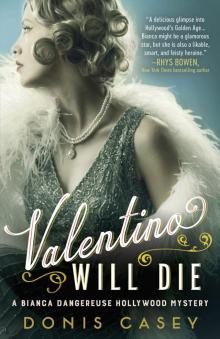 Valentino Will Die
Valentino Will Die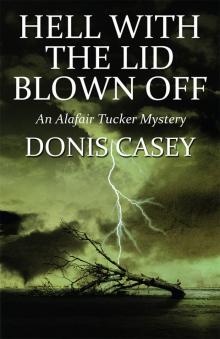 Hell With the Lid Blown Off
Hell With the Lid Blown Off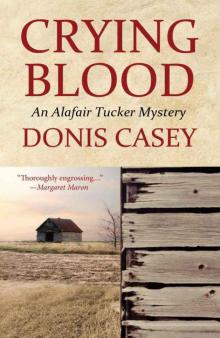 Crying Blood - An Alafair Tucker Mystery
Crying Blood - An Alafair Tucker Mystery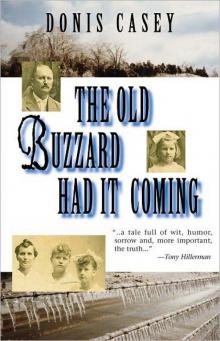 The Old Buzzard Had It Coming: An Alafair Tucker Mystery
The Old Buzzard Had It Coming: An Alafair Tucker Mystery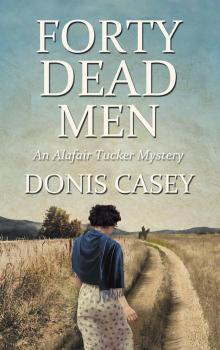 Forty Dead Men
Forty Dead Men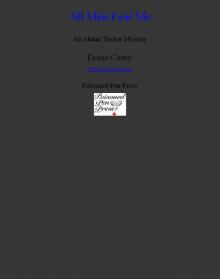 All Men Fear Me
All Men Fear Me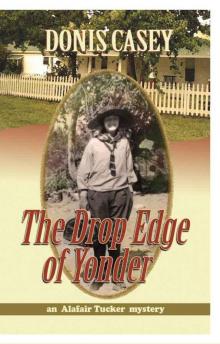 The Drop Edge of Yonder - An Alafair Tucker Mystery
The Drop Edge of Yonder - An Alafair Tucker Mystery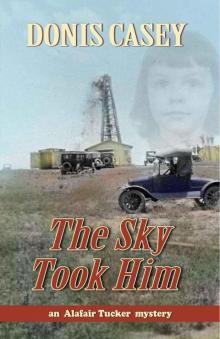 The Sky Took Him - An Alafair Tucker Mystery
The Sky Took Him - An Alafair Tucker Mystery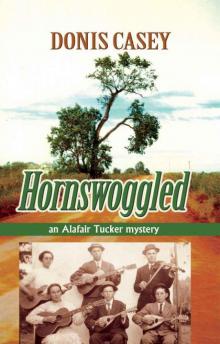 Hornswoggled - An Alafair Tucker Mystery
Hornswoggled - An Alafair Tucker Mystery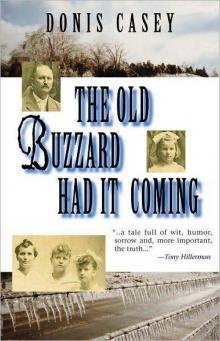 The Old Buzzard Had It Coming
The Old Buzzard Had It Coming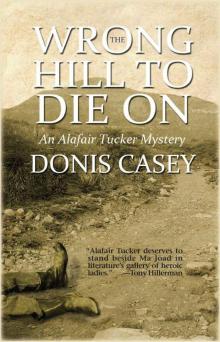 The Wrong Hill to Die On: An Alafair Tucker Mystery #6 (Alafair Tucker Mysteries)
The Wrong Hill to Die On: An Alafair Tucker Mystery #6 (Alafair Tucker Mysteries)